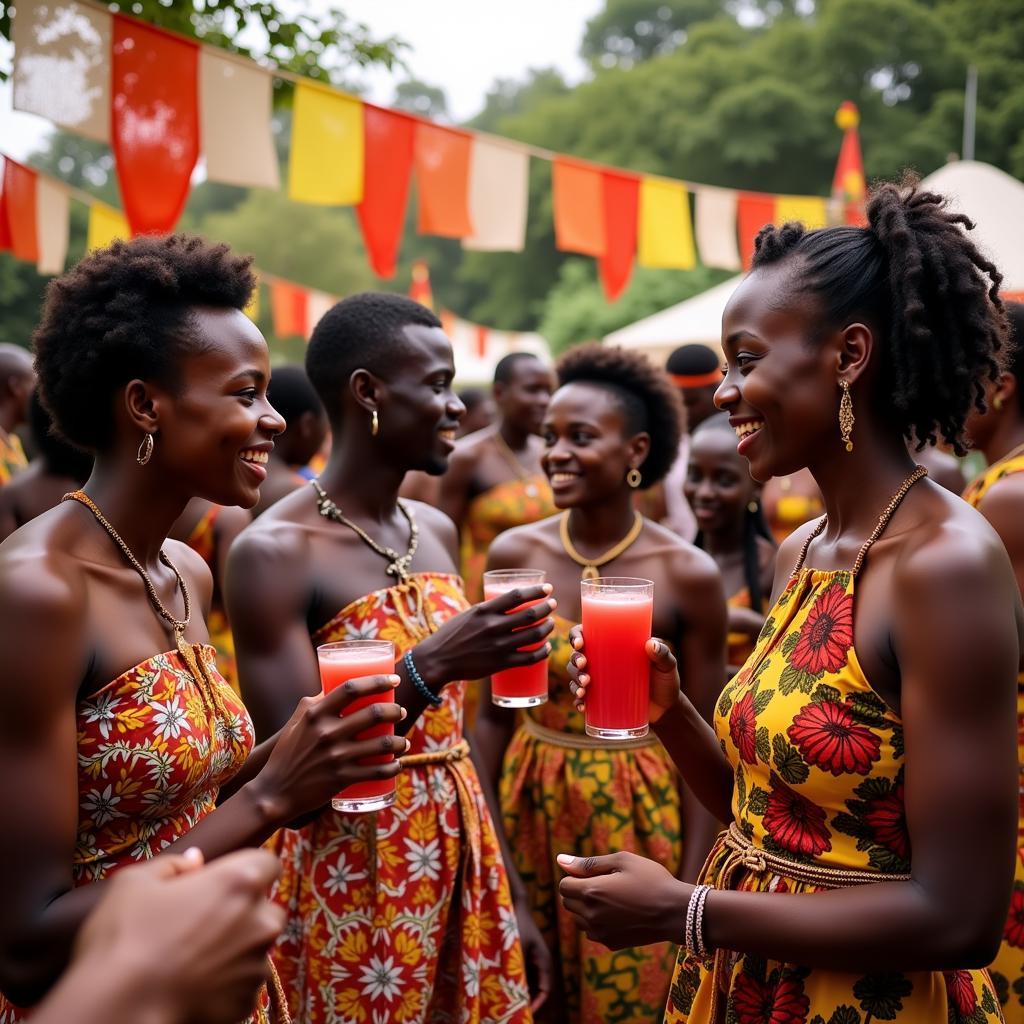The Vibrant World of African Hibiscus Drink
African Hibiscus Drink, a vibrant and refreshing beverage, is more than just a thirst quencher; it’s a taste of African culture and tradition. From bustling marketplaces to quiet family gatherings, this crimson-colored drink, known as bissap, zobo, or sorrel in various regions, holds a special place in the hearts and homes of many Africans. This article delves into the rich history, diverse preparations, and numerous health benefits of this beloved beverage.
A Journey Through History and Culture
Hibiscus, known scientifically as Hibiscus sabdariffa, has a long and rich history in Africa. Evidence suggests its use dates back centuries, with ancient Egyptians utilizing the plant for medicinal purposes. Over time, it evolved into a popular beverage, deeply embedded in social customs and daily life. Today, it’s a staple at celebrations, weddings, and funerals, often shared as a symbol of hospitality and community. Check out more traditional african beverages.
Regional Variations and Unique Twists
While the core ingredient remains the same, the preparation of African hibiscus drink varies significantly across the continent. In West Africa, bissap is often spiced with ginger, cloves, or mint, lending a warm, aromatic flavor. In Nigeria, zobo is commonly sweetened with pineapple juice or artificial sweeteners, creating a sweeter, more tart profile. East Africans often infuse their sorrel with cinnamon and cardamom, adding a unique spicy dimension. These regional variations highlight the diversity of African culinary traditions and offer a fascinating glimpse into the continent’s rich tapestry of flavors.
Health Benefits: A Natural Elixir
Beyond its delightful taste, African hibiscus drink boasts an impressive array of health benefits. Rich in antioxidants, it helps combat free radicals, protecting the body against cellular damage. Studies suggest it can help lower blood pressure, improve liver health, and even aid in weight management. The drink is also a good source of vitamin C, boosting the immune system and promoting overall well-being.
“Hibiscus is a powerhouse of nutrients,” explains Dr. Adeola Olayinka, a renowned Nigerian nutritionist. “Its regular consumption can contribute significantly to a healthy lifestyle.”
Making Hibiscus Drink at Home: A Simple Guide
Preparing this refreshing beverage at home is remarkably easy. Simply steep dried hibiscus flowers in boiling water, allowing them to infuse for several hours. Strain the mixture, sweeten to taste, and chill before serving. Experiment with different spices and flavorings to create your own signature blend. For those looking for a quick fix, ready-made hibiscus tea bags are also readily available. Consider pairing it with a delicious african food menu.
Tips for the Perfect Brew
- Use filtered water for the best flavor.
- Adjust the steeping time to control the intensity of the drink.
- Add natural sweeteners like honey or agave nectar for a healthier option.
- Experiment with different spices like ginger, cinnamon, or mint.
 African Hibiscus Drink Celebration
African Hibiscus Drink Celebration
A Versatile Beverage for Every Occasion
African hibiscus drink is incredibly versatile, enjoyed both hot and cold. During the scorching summer months, a chilled glass of bissap is the perfect way to beat the heat. In cooler weather, a warm cup of sorrel provides a comforting and invigorating experience. Whether enjoyed as a standalone beverage or paired with a meal, hibiscus drink adds a touch of vibrant color and flavor to any occasion. You can find this beverage and other refreshing african fruit juice at many different venues.
“Hibiscus drink is not just a beverage; it’s an experience,” says Chef Kofi Atta, a Ghanaian culinary expert. “Its versatility and refreshing nature make it a perfect complement to any meal or celebration.” Try it at one of the many african clubs in cairo.
Conclusion
African hibiscus drink is more than just a beverage; it’s a cultural symbol, a health tonic, and a testament to the continent’s rich culinary heritage. From its vibrant color to its refreshing taste and numerous health benefits, African hibiscus drink offers a unique and delightful experience for all. So, the next time you’re looking for a healthy and flavorful drink, try a glass of this vibrant elixir and embark on a journey through the flavors of Africa.
FAQ
- What is African hibiscus drink called? It has various names, including bissap, zobo, and sorrel.
- Is hibiscus drink good for you? Yes, it’s rich in antioxidants and may offer various health benefits.
- How do you make hibiscus drink? Steep dried hibiscus flowers in boiling water, strain, sweeten, and chill.
- Can you drink hibiscus tea hot? Yes, it can be enjoyed both hot and cold.
- What does hibiscus tea taste like? It has a tart, slightly floral flavor.
- Where can I buy dried hibiscus flowers? They’re available in many health food stores and online.
- Can pregnant women drink hibiscus tea? It’s best to consult a doctor before consuming hibiscus tea during pregnancy.
Scenarios Where Hibiscus Drink is Commonly Enjoyed
- Family gatherings and celebrations
- Weddings and other special occasions
- As a refreshing drink on a hot day
- As a warm beverage during cooler weather
- Offered as a gesture of hospitality to guests
Further Exploration
Explore more about african baby shower decorations.
Contact Us
For further assistance or inquiries, please contact us at:
Phone: +255768904061
Email: kaka.mag@gmail.com
Address: Mbarali DC Mawindi, Kangaga, Tanzania
Our customer care team is available 24/7.


